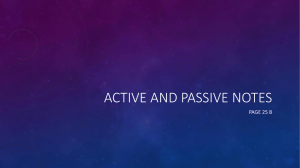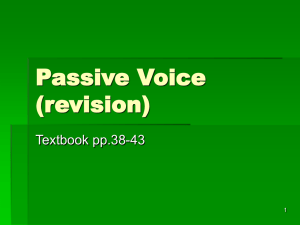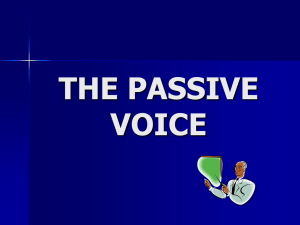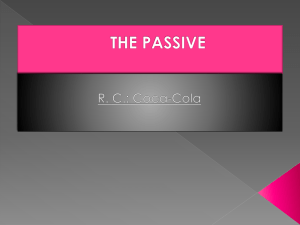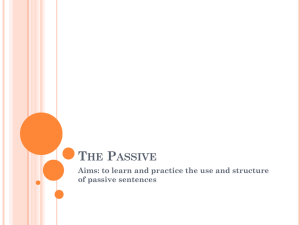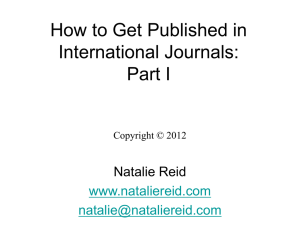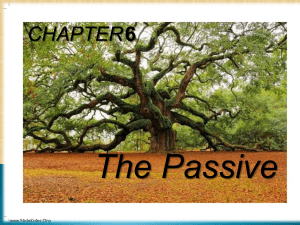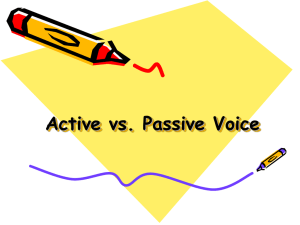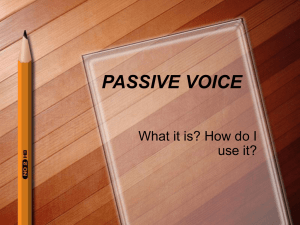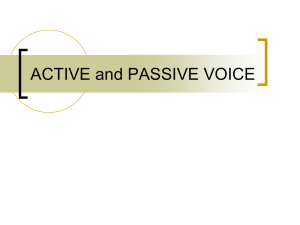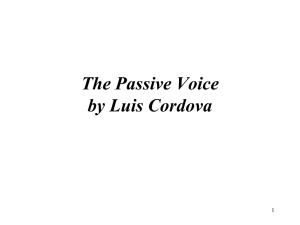passive
advertisement
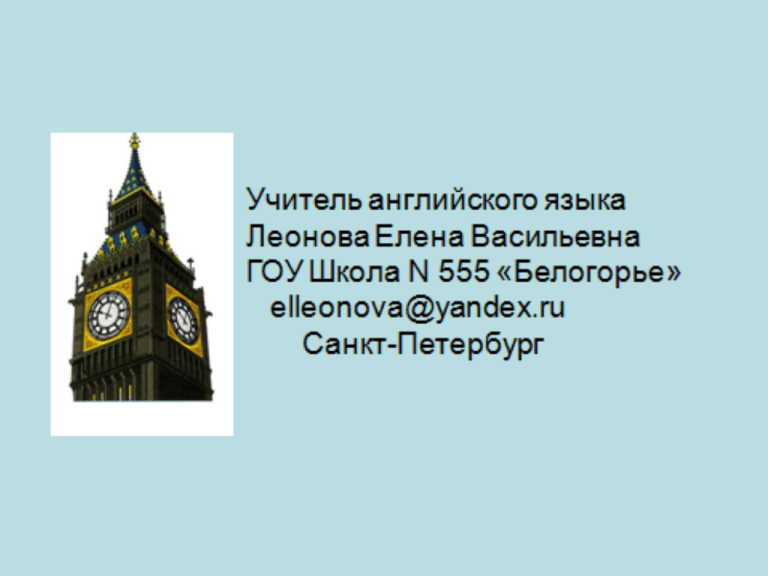
The verb to be • • • • • • • Present Simple Present Continuous Present Perfect Past Simple Past Continuous Past Perfect Future (will) • • • • • • • am-is-are am-is-are being have-has been was-were was-were being had been will be The Passive • The Parthenon was built in the 5th century BC. It is visited by thousands of tourists every year. The Passive to be + past participle •affirmative: He was given a book •interrogative: Was he given a book? •negative: He wasn’t given a book. He wants to be told the truth. He expects to be given a promotion. The passive of infinitives to be + past participle The letters must be sent tomorrow. The reports should be typed immediately. The passive of modal verbs modal verb + be + past participle Look at the prompts and make sentences using the present simple passive, as in the example. Volkswagen cars are made in Germany. 1. a lot of rice/eat/India 2. snails/eat/France 3. Coca Cola/produce/the USA 4. coffee/grow/Brazil 5. beer/produce/Germany Do we know who built the Parthenon? • We use the passive when we don’t know who did the action of the verb. Match columns to make correct sentences using the past simple passive. Oliver Twist was written by Charles Dickens. • • • • • • • The ‘Mona Lisa’ (paint) The Eiffel Tower (build) ‘Jurassic Park’ (direct) ‘Carmen’ (compose) America (discover) The telephone (invent) Alexandria (found) • • • • • • • Leonardo da Vinci Steven Spielberg Alexander the Great Georges Bizet Gustave Eiffel Christopher Columbus Alexander Graham Bell Use The missing climber was found yesterday. • Do we know who found the missing climber? • Is it important to know who found him? • What is important? Mrs Edison is a businesswoman. She was away on a business trip but now she is back. She wants to know what has been done while she was away. Ask and answer as in the example. - Have they delivered my new desk? - No, it hasn’t been delivered yet. - Have you posted the invitations? - Yes, they have already been posted. • • • • they/repair/the photocopier? (Yes) you/type/last month's reports? (No) you/place/advertisement in the newspaper?(No) you/pay/the bills? (Yes) Use We use the passive when the action of the verb is more important than the person who carries out the action. The ‘Mona Lisa’ was painted by Leonardo da Vinci. The boys were rescued by an old woman. ‘by Leonardo da Vinci’ and ‘by an old woman’ are the agents. - Do we know who painted the ‘Mona Lisa’? - Do we know who rescued the boys? The agent is mentioned only when the identity of the agent is important or needs to be stated. Jim’s car was stolen last night. • Do we know who stole Jim’s car? Champagne is made in France. • Is it important to know who makes champagne? The bank robbers are being chased. Is it obvious who is chasing the bank robbers? We do not mention the agent when it is unknown, unimportant or obvious from the context. Turning the active into the passive S V O • Mary sent the invitations. S V agent • The invitations were sent by Mary. 1.What happens to the subjects in the active sentence? 2.What happens to the verb? 3.What happens to the object in the active sentence? He is working hard. • Is there an object of a sentence? Only the verbs which take an object of the active sentence (transitive verbs) can be turned into the passive. Someone informed the police. The police were informed. • When the subject of the active sentence is one of the words: people, one, someone, somebody, they, he, etc. the agent is often omitted in the passive sentence. He sent this postcard to me. I was sent this postcard. • Object pronouns become subject pronouns in the passive. A nurse looks after the baby. The baby is looked after by a nurse. • When the verb of the active sentence is followed by a preposition, the preposition is kept in the passive sentence as well. • • • • • • • • active She types the letters. • She is typing the letters. • She typed the letters. • She was typing the • letters. She has typed the letters. • She had typed the letters. • She will type the letters. • She may type the letters. • passive The letters are typed. The letters are being typed. The letters were typed. The letters were being typed. The letters have been typed The letters had been typed. The letters will be typed. The letters may be typed.
